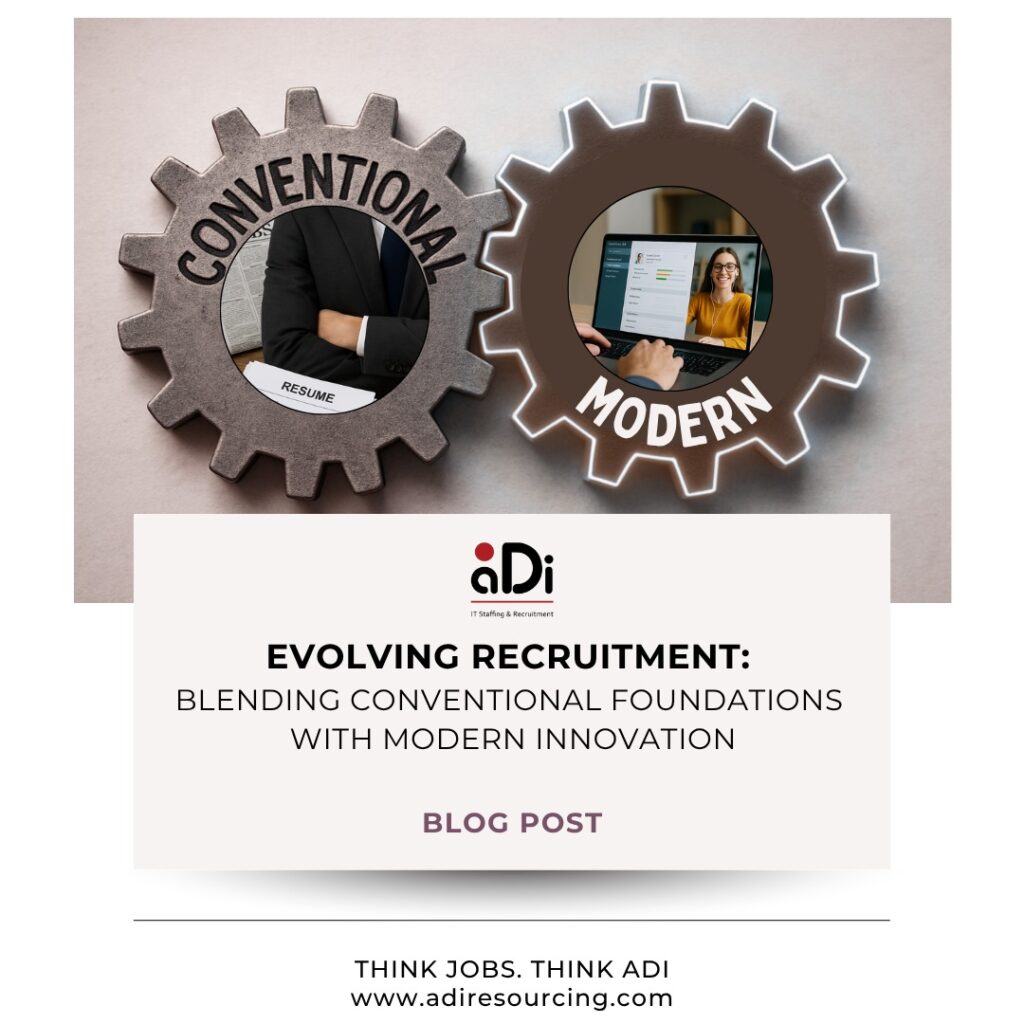
Recruitment isn’t what it used to be
—and that’s a good thing.
While the fundamentals of hiring remain—finding the right talent for the right role—how we recruit must evolve. Traditional recruitment practices provided structure, rigor, and relationship-building. But today’s talent market demands agility, personalization, and tech-driven strategies.
This blog explores how we can adapt traditional recruitment methods to align with modern recruitment needs—creating a balanced, future-ready hiring approach. Whether you’re managing talent internally or working with a recruitment partner, the goal is the same: build a hiring model that’s strategic, scalable, and human-centered.
From Traditional Roots to Modern Realities: A Framework for Adaptation
1. Candidate Engagement: From Reactive to Relational
Traditional Strength: Job postings and referrals ensure process clarity and consistency.
Modern Adaptation: Combine these with proactive sourcing using social media, talent mapping, and personalized outreach. Traditional channels bring reliability; modern tools bring speed. A forward-thinking recruitment partner will use both effectively.
2. Candidate Expectations: From Fit to Fulfillment
Traditional View: Candidates needed to fit the company mold.
Modern Adaptation: Now it’s about mutual fitness. Retain structured interviews, but enrich them with discussions on purpose, flexibility, and personal growth. In modern recruitment, we don’t just evaluate—we listen and co-create.
3. Technology: Supporting, Not Replacing Human Judgment
Traditional View: Manual reviews and in-person interviews were central to the process.
Modern Adaptation: Use AI to screen resumes or schedule interviews, freeing recruiters for deeper, value-driven conversations. Let tech augment—not replace—human instinct.
4. Employer Branding: From Internal Culture to Public Narrative
Traditional Approach: Culture was experienced on the job.
Modern Adaptation: Share it publicly. Leverage storytelling, employee voices, and digital platforms bring your employer brand to life. A trusted recruitment partner can help amplify this message across channels.
5. Company Culture: From Quiet Strength to Strategic Spotlight
Traditional View: Culture was important, but often unspoken.
Modern Adaptation: Make it visible. Highlight cultural values during recruitment through testimonials, leadership messaging, and authentic touchpoints.
6. Skills vs. Experience: Expanding the Lens
Traditional Focus: Years of experience and pedigree were prioritized.
Modern Adaptation: Value experience, but don’t overlook soft skills like adaptability and problem-solving. Modern recruitment evaluates potential through practical exercises, case studies, and learning agility.
The Path Forward: Integrating Old Wisdom with New Tools
You don’t need to abandon traditional recruitment—just evolve it.
Modern recruitment isn’t about discarding the past; it’s about enhancing it. Use the structure, relationships, and trust of traditional methods, and elevate them with technology, data, and empathy. This is the formula top recruitment partners are using to help organizations win talent today.
Final Thoughts: How to Evolve Your Recruitment Strategy
- Preserve what works—strong processes, relationship focus, and employer integrity
- Introduce what’s needed—speed, tech, flexibility, and candidate-centric practices
- Keep learning—from candidates, hiring outcomes, and the ever-changing talent landscape
Modern recruitment doesn’t erase the past—it transforms it.
Looking for a recruitment partner who understands this balance?
Let’s build your hiring strategy for today—and tomorrow. Connect with us today.
website: www.adiresourcing.com
phone: +66 63 839 1690
mail: info@adiresourcing.com








 English
English 中文 (中国)
中文 (中国) Tiếng Việt
Tiếng Việt ไทย
ไทย Bahasa
Bahasa